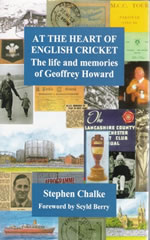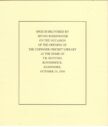At the Heart of English Cricket
Martin Chandler |Published: 2001
Pages: 224
Author: Chalke, Stephen
Publisher: Fairfield Books
Rating: 5 stars

On reflection I have some difficulty understanding why this book languished in my bookcase, unread, for so long. I knew it had received considerable acclaim on publication and won at least one award and that, coupled with the fact that it was written by Stephen Chalke, really should have led me to it earlier than 2010’s Easter break.
The trap I fell into, and the main purpose of this review is to stop others doing the same, was to assume that because Geoffrey Howard’s entire First Class career took place in the space of a fortnight in 1930 that his story, inevitably therefore concentrating on his later career as an administrator, would not be an exciting one.
In reality the book is anything but dull. Howard’s was a fascinating life and quite unlike anything I have read before. He was already over 90 years of age when work on his story began but the chemistry that existed between subject and author shines through in every sentence that Stephen Chalke has written.
Although it is not a biography in the traditional sense the book is based around an account of Geoffrey Howard’s life. He came from an interesting lower middle class background and, while pursuing a career in banking, batted in London club cricket with considerable success. He had the opportunity to become a county professional but, unwilling to take the risk, had just that uneventful fortnight with Middlesex as an amateur.
After the war, and having spent seven years away from the office in the RAF, Howard could not settle back into his old way of life at Martins Bank and soon left to become Assistant Secretary with Surrey. Two years later he went on to become Lancashire Secretary where he remained until 1965 before going back to Surrey and the Secretary’s position there. In addition during the 1950’s he managed three MCC tours, a role his personality and temperament were ideally suited to.
The highlights of the book are some remarkable insights into some of the more interesting corners of post war English cricket and those overseas trips in particular. In the absence of full tour accounts elsewhere the chapters on the MCC tour of India in 1951/52 and the MCC “A” tour of Pakistan in 1955/56 are particularly valuable. Only here, for the first time, do we get the full story of the “kidnapping” of Pakistani umpire Idris Begh on the latter tour, and a richly entertaining tale it is too.
The quality of the chapters relating to the trips to the Subcontinent started me thinking in terms of making this a five star review but it is the insights into two rather better known aspects of cricket history that clinched it. Firstly, as Lancashire secretary in 1956, no one was better placed than Howard to explain what really happened during the preparation of the pitch for “Laker’s match” – after reading this book you will know if the Australian conspiracy theories are justified or just sour grapes.
The last, and most compelling reason for the five star rating, are the chapters on the 1954/55 Ashes series which make up around one fifth of the book. Hutton, as a professional was, in the eyes of some, a controversial choice as England captain. His critics were, inevitably, far from silent after he put Australia in after winning the first toss of the series, with disastrous consequences. After that setback however Hutton’s young lions roared and Frank Tyson, Brian Statham, Peter May and Colin Cowdrey were at the forefront of an England recovery so forceful that only the Sydney rain prevented them winning all four of the remaining Tests. Not surprisingly that series has, the 1932/33 Bodyline Tests apart, had more written about it than any other encounter in the history of the Ashes. Stephen Chalke’s ability to, despite that, present the story of the tour in the entirely fresh and vibrant manner that he does is the reason why, for me, this book is certainly the equal of CW’s first five star book, the same author’s masterful life of Bob Appleyard, “No Coward Soul”.






Leave a comment